Here in Europe attempts are being made to get around GMO legislation by redefining what genetic engineering is. In particular, even after the EU Court of Justice ruled that such attempts are illegal, the same arguments are being tried here in the Netherlands.
GMO ‘light’
It’s completely absurd to say this is somehow a different kind of genetic engineering. The only ‘light’ thing about this technique is the cost and simplicity. It used to be there was considerable cost and research behind each new genetically engineered variety, but this method can cost as little as US$75 and is much faster and easier to execute. That means more corporate profits, but all of the other issues surrounding GMOs remain.
It’s absolutely silly to say that since this method only ‘turns off’ small parts of the genome, that this is somehow fundamentally different.
‘The question is: do you want potatoes that need to be sprayed 15 times or do you want potatoes that can do without this amount of spraying because of this technology?’
This is a ridiculous question, completely rhetorical and grounded in fake news.
For one thing, in Europe the chemicals you might spray a potato with are being phased out. There isn’t a question of spraying a potato 15 times anymore.
There are also traditional breeding efforts underway, including F1 hybrids and organic breeding, which all show promise.
While it might seem very exciting to use genetic engineering to modify potatoes to resist blight, this has also been described as ‘gene mining’. That is you take all the currently known genes that resist blight and put them into a single potato, something that would be very difficult with traditional breeding. The problem with this is you can also overlook other gene ‘markers’ (combinations of genes that also resist blight), and once blight has evolved it will overcome even this resistance. This is the same mentality behind spraying crops with chemicals, thinking even after the chemicals stop working, it will always be possible to develop new and stronger chemicals.
In fact with all GMO varieties to date promising to resist diseases or pests and reduce the need for chemicals, they have all failed in their promises. The diseases or pests simply develop resistance, and the need for chemicals returns. There’s no reason to think GMO potatoes will be any different. In the case of for example bt based GMOs, these crops have seriously interfered with organic efforts. There’s no reason to think GM potatoes won’t also interfere with organic efforts in a similar way.
A better approach is a combination of stopping with the use of chemicals, traditional breeding, permaculture techniques and improving the environment through reducing greenhouse gases and other environmental pollutants. This will reduce the disease pressure in agriculture, and allow the potato genome to evolve and create it’s own resistance to potato blight. In the longer term this will be a sustainable process.
Competing with Centuries of Evolution
All GMO techniques are competing with centuries of evolution. While you might be able to find some short term quick fixes with GMOs, there’s not likely to be any major breakthroughs with genetic engineering. It’s not likely to speed evolution.
Intellectual Property Rights (IPR) are Too Strong
Especially over the last few decades, IPR have become too strong. These have mostly been implemented in undemocratic ways, with very unpopular trade agreements or rules put into place by international institutions inaccessible through democratic principles.
There are direct rights like patents, and indirect rights like what the Convention on Biological Diversity convey.
The economic driving power behind GMOs is too strong, and severely limits any sort of reasonable public debate.
Everyone would benefit if this sort of science existed in the public domain, and independent (amateur) scientists also had an opportunity to demonstrate what they can offer.
Nothing for the Consumer
Things like improving yields, or resistance to pests, are fine for farmers and corporate interests. No agricultural GMO has ever been marketed according to consumer demand. Nothing. If science has nothing but fake news to address consumer demand with, they should accept there is nothing to put on the market.
Lack of Functioning Democracy
I guess there are problems with democracy almost everywhere, but since this post was specifically intended to address the situation in The Netherlands, let me say something about democracy here.
There is a serious deficiency of free expression here. I understand this is a problem for many people, but it’s particularly acute for people with a foreign background or those unable to communicate fully and fluently in Dutch. While there have been some very public examples of this recently, there’s very little acceptance this is a common problem, also in smaller less dramatic ways.
A government can simply not say there is a public consultation on an issue like this, if there is no truly democratic forum in which to express and freely discuss opinions.




